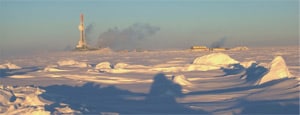MILESTONES: ARCTIC
By Paula L. Green
The Danish government is embarking on a precarious high-wire act as it presents an Arctic seabed claim to the UN Commission on the Limits of the Continental Shelf.
 |
|
Danish Arctic claims clash with Russia and Canada |
A joint effort of Denmark and its autonomously governed territories of Greenland and the Faroe Islands, the oil and gas reserves development strategy aims to balance the interests of private investors, environmentalists, the region’s indigenous population and the burgeoning interests of governments as far away as China. The Danish seabed claim clashes with other territorial claims made by Russia and Canada.
In announcing the Arctic strategy to 2020, Denmark’s foreign minister Lene Espersen said that the approach is crucial as global warming leads to deep changes throughout the region. According to a report issued earlier this year by the Arctic Monitoring and Assessment Program, a scientific body set up by the eight Arctic rim countries, the Arctic region has been warming twice as fast as the global average in recent decades. The report says the latest five-year period is the warmest since measurements began being recorded in the 19th century.
Covering more than a sixth of the planet’s landmass and enveloping the Arctic ocean, the Arctic region is home to about 4 million people. The US Geological Survey reports that the area holds about 30% of the world’s unproven gas reserves and 10% of its unproven oil reserves. The largest Arctic assets of Denmark are vast oil and gas reserves off the coast of Greenland, which has issued more than 15 exploration licenses for its west coast to nearly a dozen companies. These include major energy corporations like Royal Dutch Shell, Exxon Mobil and Britain’s Cairn Energy, which is now running test drills.
Until now, regional issues—which do not include territorial claims—have been discussed primarily by the eight members of the Arctic Council: Russia, the United States, Canada, Norway, Denmark, Sweden, Finland and Iceland. Denmark plans to push group expansion at the council’s next ministerial level meeting in 2013.



